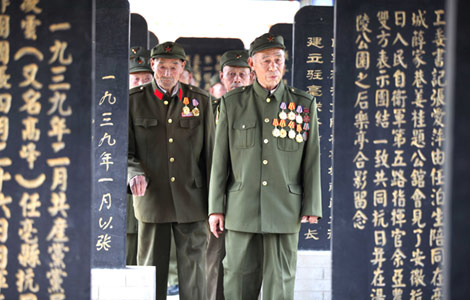Logistics co-op needed between China and ASEAN
Updated: 2012-09-26 09:43
By Yan Yiqi and Huang Feifei in Nanning (China Daily)
|
||||||||
As China-ASEAN bilateral trade enters a period of fast growth, integrated logistics cooperation is seen as essential to further boosting trade relations between China and the Association of Southeast Asian Nations.
Government officials, industry experts and companies from both regions are urging both sides to improve logistics cooperation.
"With the establishment of the China-ASEAN Free Trade Area two years ago, the trade volume between the two regions has increased rapidly," Liao Xiaobo, vice-director of the development and reform commission of the Guangxi Zhuang autonomous region, said at the China-ASEAN Logistics Cooperation Forum on Monday. "However, the key to develop bilateral trade - logistics services - have not improved accordingly."
|
 A visitor looks at blackwood products shown by a Vietnamese exhibitor at the ninth China-ASEAN Expo in Nanning, Guangxi Zhuang autonomous region, Sept 23, 2012. [Photo/Xinhua] |
Last year, trade between China and ASEAN reached $362.85 billion, an increase of 23.9 percent year-on-year. The figure was $105.9 billion in 2004.
Liao said several obstacles are hampering the development of an integrated logistics system.
"Although air and maritime transportation have been improved greatly in recent years, basic overland infrastructure construction is lagging behind. Due to our geographic advantage regarding ASEAN countries, transportation through land should be a core part of logistics services," he said.
The first cross-border highway between China and Vietnam was built seven years ago, but a planned full road project to connect China and Singapore via Vietnam, Laos, Thailand and Malaysia is far from completion.
"The whole project is of strategic importance to both China and ASEAN, and it's the basis of an integrated logistics system. If countries such as Vietnam and Laos are having difficulties completing the project, then Guangxi is very glad to help," said Liao.
Zhang Fuli, president of the Guangxi Federation of Logistics and Purchasing, said a lack of a unified standardization system in logistics is another problem.
"The absence of standardization has been a big problem for many years," he said.
Zhang said the country is now working out a standardized regulation system that can also be applied to ASEAN countries, which is expected to be introduced next year.
"Most of the logistics companies in Guangxi are small ones with single business models. The priority now is to form an integrated logistics system that can cover the whole supply chain," he said.
Tran Duc Nghia, deputy director of Delta International Co in Vietnam, said differences in standards and regulation are obstacles to further development.
Tran's company is a logistics services provider, whose core business is customs clearance, inland trucking and warehouse services.
"I am looking forward to a simplified cooperation model that can link Chinese logistics companies with ours much more easily. My visit to Nanning this time is to emphasize the importance of improving cross-border trucking between China and Vietnam, and to look for partnerships with Chinese companies," he said.
Chinese logistics companies echoed that view.
Qin Shanrong, chairman of the Guohao International Group in Guangxi, said his company would have developed faster if an integrated logistics system was already in place.
"We have already sent employees to countries such as Thailand, Vietnam and Singapore to research the market. But good connections between offices in China and Vietnam or Vietnam and Laos are not enough. Every country should have good connections to neighboring countries, which has yet to be achieved," he said.
Contact the writers at yanyiqi@chinadaily.com.cn and huangfeifei@chinadaily.com.cn










